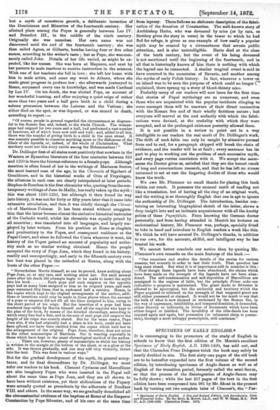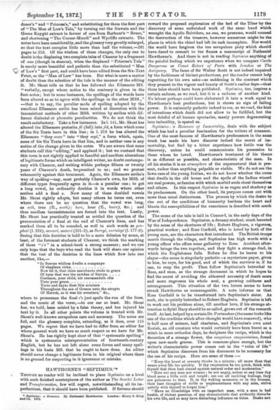SPECIMENS OF EARLY ENGLISH.*
IT is encouraging to the promoters of the study of English in schools to know that the first edition of Dr. Morris's excellent Specimens of Early English, A.D. 1250-1400, has sold out, and that the Clarendon Press Delegates think the book may safely be nearly doubled in size. The first sixty-one pages of the old book are to be hereafter expanded into the first volume of the second edition, by introducing specimens of Anglo-Saxon as well as of English of the transition period, formerly called the semi-Saxan, so that the process of the disintegration of Anglo-Saxon may be fully shown ; while the last 317 pages of the text in the first edition have been compressed into 281 by Mr. Skeat in the present book by turning out two complete tales of Chaucer's, the "Par- * Specimens of Early English. A New and Salted Edition, with Introduction, Notes, and Glossarial Index, By the Revs. R. Morrie, LL.D., and W. W. Skeet, M.A. Part IL, A.D. 1298-1388. Clarendon Press. 1872.
doner's " and " Prioreas's," and substituting for them the first part of "The Man of Law's Tale," by turning out the Gawain and the Grene Knyght extract in favour of one from Barbour's "Bruce," and shortening "The Cursor-Mundi" and Wycliffe extracts. The notes have been considerably, and the glossary very greatly enlarged, so that the text occupies little more than half the volume,-281 pages to 216. Of the wisdom of these changes, the only one to doubt is the displacing two complete tales of Chaucer by a fragment of one (though in stanzas), when the displaced "Prioress's Tale" is surely more beautiful and pathetic than the substituted "Man IC. of Law's" first part, and could have been edited from the Six-Text Print, as the "Man of Law" has been. But what is more a matter of doubt than the selection of the tale is the manner of the editing it. Mr. Skeet tells us that he has followed the Ellesmere MS. "verbally, except where notice to the contrary is given in the foot-notes ; but in some instances, the spellings of the words have been altered so as to agree with the spellings in the other MSS.," —that is to say, the peculiar mode of spelling adopted by the excellent Ellesmere scribe has been mixed at discretion with the inconsistent methods of other MSS. written by scribes with dif- ferent dialectal or phonetic peculiarities. We do not think the result satisfactory. Take a few instances. In I. 141, Mr. Skeat has altered the Ellesmere preterite ft (fell) into Jet, a form which none of the Six Texts have in this line ; in 1. 218 he has altered the Ellesmere "they same" into "they seyi," a form which, again, none of his Six Texts have in that line, and in neither case is any notice of the change given in the notes. We are aware that some students call this "editing," and applaud it ; but we contend that this term is not rightly applied to fanciful and needless alterations
of legitimate forms which an intelligent writer, no doubt contempo- rary with Chaucer, and writing within perhaps fifteen or twenty years of Chaucer's death, bequeathed to us ; and we protest vehemently against this treatment. Again, the Ellesmere scribe's way of spelling—nay, most probably Chaucer's own, for MSS. of different types frequently agree in it—is a peculiar one ; to get a long vowel, he ordinarily doubles it in words where other scribes add a final e. Now many of these doubled vowels Mr. Skeat rightly adopts, but many others he turns out, even
where there can be no question that the vowel was long, as soth, true (E., sooth); here, hear (E., heere), &c. ; and thus needless inconsistencies are forced into the text. Lastly, Mr. Skeat has practically treated as settled the question of the
pronunciation of e final at the end of Chaucer's lines, and has marked them all to be sounded, as well in such words as pro-
phete (1. 224), manerd, matere (321-2), as Surryd, curteisyl (1. 177-9). Seeing that this doctrine is held to be a mere delusion by some, at least, of the foremost students of Chaucer, we think the marking of these "e's" in a school-book a strong measure ; and we can only hope that the boys who read the book will share our opinion
that the test of the doctrine is the lines which flow into one another, like,— "In Surrye whilom dwelte a companye
Of ohapmen riche Now fel it, that thise marchantz stode in grace Of hym that was the sawdan of Surrye Cadence, your ohild, hir recomandeth ofte Unto your grace Yeats and dayes fleet this creature Throoghout the see of Greece unto the strayte Of Marrok, as it was hir &venture," dm,
where to pronounce the final e's just spoils the ran of the lines, and the music of the verse,—,to our ear at least. Mr. Skeat has, we hold, been misled by a false theory, and has injured his text by it. In all other points the volume is treated with Mr. Skeat's well-known scrupulous care and accuracy. The notes are full, and the glossary complete, extending, as it does, over 115 pages. We regret that we have had to differ from an editor for whose general work we have so much respect as we have for Mr. Skeat's. He has rightly kept clear of that "systematic spelling" which is systematic misrepresentation of fourteenth-century English, but he has not left alone some forms and many spell- ings in his basis MS. that he ought to have done. An editor should never change a legitimate form in his original where there is no ground for suspecting in it ignorance or mistake.



































 Previous page
Previous page